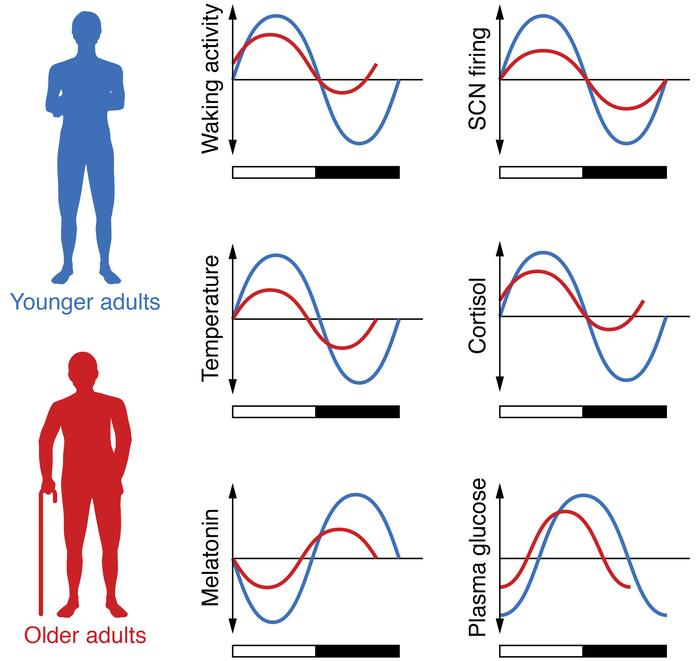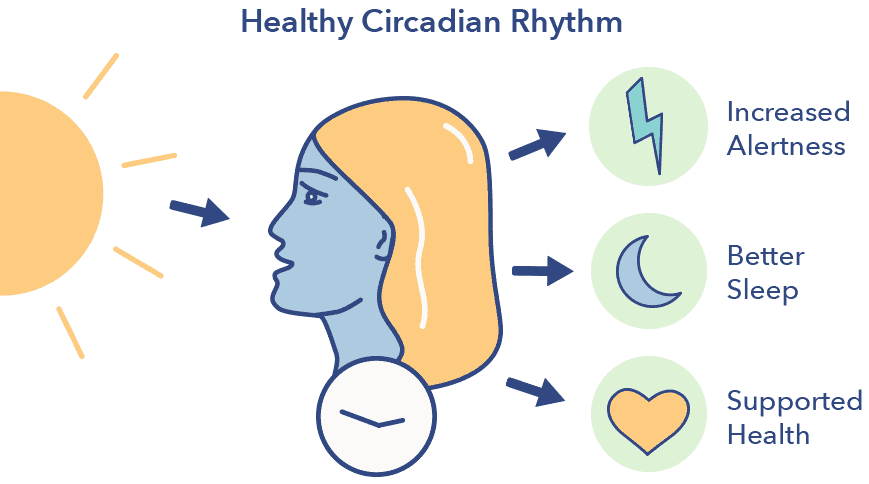by Buck Institute
July 9, 2020 . BLOG
Time to improve your health: focusing on circadian rhythms
 By Daria Timonina PhD Candidate, USC-Buck Biology of Aging Program in the Verdin lab.
By Daria Timonina PhD Candidate, USC-Buck Biology of Aging Program in the Verdin lab.
Every cell in our body has its own clock. This clock tells the cell whether it is time to energize, rest, or perform a task. In much the same way, we have times when we eat, sleep, and work. If we align our body’s internal clock with our own schedule, we can optimize our energy to help our cells work efficiently when we need them to. There’s lots of evidence that this concept of timely harmony has many positive effects for health.
This internal clock, called the circadian clock, drives a circadian rhythm in which our genes are turned on and off over a 24-hour cycle. This pattern of gene regulation directs many important functions. For example, our circadian rhythm helps us feel tired at night and energized in the morning. If you’ve ever had to shift your schedule, such as flying overseas, you’ve likely experienced jet lag. This is your body’s circadian clock thrown off its usual rhythm. Jet lag can manifest as trouble focusing during the new daytime while feeling strangely awake at night. This occurs because your circadian clock had optimized cognitive function for what was the original daytime.
The circadian clock keeps the systems of the body working in perfect synchrony. Think of it as the grand conductor of an orchestra. To perform a masterpiece the conductor must ensure that the musical notes are played by the right instruments at the right time. Our circadian conductor directs the right cells to turn on the necessary genes at the correct time. By doing so, it synchronizes the complex functions of the body to create a harmony. An example of this would be our liver, pancreas, and gut working together to digest food. Meanwhile, kidneys know to increase filtration of blood and nutrient reabsorption.

Diagram showing a 24-hour cycle of certain aspects of human biology, and how they are dampened or shifted in older adults.
Image source: “The aging clock: circadian rhythms and later life” Hood S, et al. 2017
The immune system also relies on the circadian clock to accommodate the body’s needs at different times of the day. During waking hours, you are more likely to encounter bacteria or viruses, and so more immune cells will migrate through your tissues on the lookout for invaders. During mealtimes, some immune cells move to your gut, ready to fight any invading bacteria that may be in your food. A consistent schedule can thus strengthen your immune system. A poor night of sleep is one way to mislead your circadian clock, which makes you more suspectable to getting sick.
Unfortunately, certain aspects of the circadian clock are dampened as we age. This results in incorrect gene expression; the cells are more likely to perform tasks at the wrong time or to a lesser extent. Cells not functioning properly leads to increased risk of disease. For example, poor sleep quality is linked with cognitive decline. Dysregulated food metabolism leads to increased risk of diabetes and hypertension. By modifying clock genes in flies and mice, researchers discovered that reduced circadian clock function leads to faster rates of tissue decline, impairments in cognitive function, and shorter lifespan.

Light is the main cue for a healthy circadian rhythm.
Image source: https://sleepopolis.com/education/circadian-rhythm-health/
Although we don’t (yet) know how to restore all lost aspects, the circadian system is malleable, meaning there is something you can do about it. In the same way that jet lag is temporary, we can provide our body with signals to optimize the synchrony between our circadian clock and our daily life. The primary signal for this is light. Daylight hits photoreceptors in our eyes which signal to our brain that it is daytime. Our brain, in turn, sends the message to our body and kickstarts metabolism in preparation for the day. The secondary cue is food. Ingestion of food sends signals from the gut to the rest of the body. The circadian clock is rhythmic and so the key to optimal circadian health is to be consistent on a day to day basis. Consistent with when we sleep and consistent with when we eat.
What can you do?
- Avoid light at night: As your circadian system is governed primarily by light, avoid bright lights such as those from a cell phone before bed. Bright light will give your brain conflicting signals about whether it is time for rest or activity.
- Embrace natural light in the morning: Seeing sunlight signals to your brain and body to enter its active phase.
- Go to bed and wake up at the same time: This builds a consistent rhythm that allows you to feel energized at the right time. However, if you feel an intense urge for a nap that is okay. Your body may need more time for a rest and repair phase.
- Get adequate sleep: Short or poor sleep quality stops your brain from reaching the deep, restful stages of sleep necessary for repair.
- Restrict eating times: Studies in mice show that restricting food to a daily 8-hour window improves the circadian rhythm of genes, increases metabolic health, and enhances memory. At the very least, avoid late-night snacking because food at night will send a “wake up” signal to your circadian clock.

SHARE